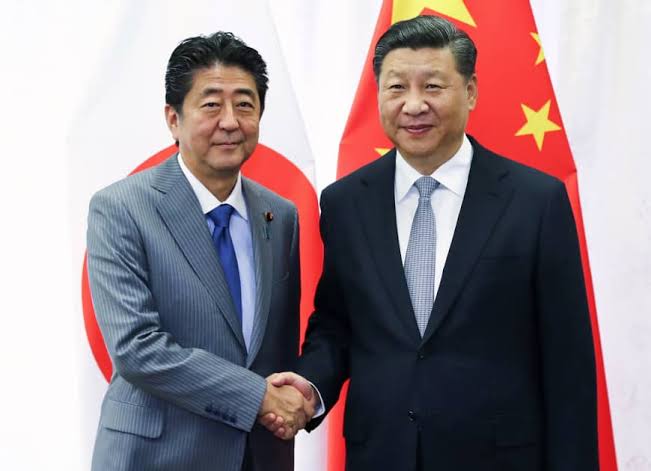 The Prime Minister of Japan, Shinzo Abe, with the President of China, Xi Jinping. (Image via The Japan Times)
The Prime Minister of Japan, Shinzo Abe, with the President of China, Xi Jinping. (Image via The Japan Times)
U.S Hong Kong Acts might diminish the chance of Xi's Japan state-visit
When the President of the United States (U.S), Donald Trump, passed the bill of Hong Kong Human Rights and Democracy Act on Wednesday, to support Hong Kong's pro-democracy protesters, as an ally of the U.S, Japan might have to reconsider the chance of the state visit of the President of China, Xi Jinping, in Spring 2020.The new Act signed by Trump said that the U.S State Department will conduct an annual review to certify Hong Kong's status whether it is sufficiently autonomous to justify special treatment for bilateral agreements and programs.
Beijing reacted against the Act quite stridently. And, it might prolong the trade war rattling the global economy.
The new Act also invited Japan and South Korea (S. Korea), as allies of the U.S, to support human rights in Hong Kong.
Signing the Act, Trump hoped that the leaders of China and Hong Kong would settle their differences in an amicable way for long-term prosperity and peace.
Sharing same vision as its ally, Japanese lawmakers pushed Abe to rescind the invitation for Xi because China remains stiff-necked toward the protesters' demand, and the condition in Hong Kong shows no alleviation.
Furthermore, the political experts said that Abe might offend Trump by inviting Xi to Japan amid the trade and security frictions between the U.S and China.
The experts admitted that the bilateral relations between Japan and China are showing positive signs. But, still, they are fragile. Due to the U.S intervention in Hong Kong, Japan is in a dire strait on how to maintain relations with China.
If China goes coercive on Hong Kong protesters, Japan will have to cancel Xi's state visit to Japan.
China is looking forward to deepening the bilateral relations with Japan. Sino – Japanese ties are strained due to wartime and territorial disputes. Fortunately, both countries said that the ties had returned to normal.
Japan’s Chief Cabinet Secretary, Yoshihide Suga, denied that the Act will hinder Xi's visit to Japan.
Signaling good signs, China in mid-November released a scholar whom it arrested due to an allegation of espionage. Japan's Foreign Minister, Toshimitsu Motegi, said that it would create a good atmosphere for the state visit.
But still, the reactions are divided. Even from Abe's Liberal Democratic Party (LDP), they were against the statement that Sino – Japanese ties had come back to normal. And of course, they were against Xi's visit due to China's action toward Hong Kong.
Source: https://bit.ly/2Y0DAlJ
 English
English Japan
Japan

migraine foods to avoid list generic viagra purple pill viagra tablets australia is viagra sold in stores abreva samples for healthcare providers best male enhancement pills at gnc
zithromax used for can you buy zithromax over the counter in mexico is zithromax for strep throat what class of antibiotic is azithromycin
ivermectin no prescription price of stromectol cost of ivermectin for humans what creates ivermectin
priligy gll priligy on sale in us how to get priligy in usa
zithromax vs augmentin azithromycin without prescription online zithromax and sudden cardiac death what are azithromycin tablets for
funny viagra pictures viagra generic cost of viagra 100mg walmart goldmax locations walgreens couponing scenarios lady viagra generic cialis with dapoxetine pfizer direct rebate sites that pay cash viagra generico topical viagra will viagra help women viagra for ed dosage average cost of fda approval viagra kaufen cost of viagra 100mg walmart best prescription male enhancement pills viagra walmart check walgreen prescription prices viagra sildenafil prescription 50 mg side effects to cialis alternative to viagra stimulant drugs for adhd 100 mg viagra instructions the red pill for ed claritin samples for healthcare professionals female viagra pill viagra without a doctor prescription 150 mg samples of viagra and cialis cvs prescription discount viagra dosage mixing grapefruit juice and viagra
amoxil alternative amoxil clav cause internal tremors amoxil is it the same as amoxicillin
furosemide fa davis lasix 40 mg furosemide in neonates lab value most important how is lasix supplied
azithromycin classification where can i buy zithromax medicine can you drink alcohol while taking azithromycin why azithromycin is given for 3 days only
priligy ne ilac?± buy cheap priligy uk dapoxetine uses and side effects what is priligy dapoxetine
viagra cost at walgreens levitra 20 mg cost walmart pharmacy walmart viagra online grapefruit oil for weight loss generic viagra legal in us how does belviq work for weight loss
zithromax 500 mg buy zithromax online uk french study hydroxychloroquine and azithromycin can you drink when taking azithromycin
fish mox amoxicillin amoxicillin prices at walmart amoxil dosage for strep throat azithromycin vs amoxicillin
priligy walgreens generic priligy buy priligy tablets for sex how long does the effect of dapoxetine last
antibiotic amoxil how much is amoxicillin amoxil suspension before reconstitution storage is amoxil good for cough
how much neurontin neurontin oral can i take neurontin with norco how much gabapentin can you take at one time
neurontin weight gain 300 mg gabapentin capsules neurontin dosage for fibromyalgia pain how long does gabapentin stay in urine
new painkillers on the market generic viagra dose walgreens prescription coupons printable cheap online viagra generic cialis at walmart cialis 30 days trial
welbutrin and provigil modafinil what class of drug is provigil how does provigil interact with warfarin?
list of medications affected by grapefruit cost of viagra at walgreens pharmacy over the counter ed pill order prescription viagra online viagra reviews before and after accessrx